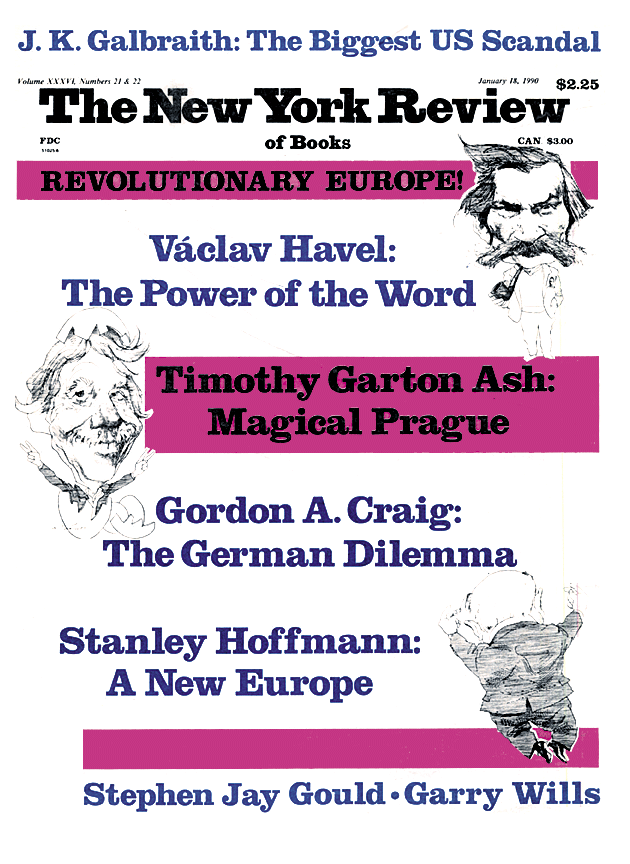Communism has been driven to yield over its Eastern European garrisons to an unknowable future, not by force of arms but by the collapse of its will for further struggle under the weight of all the history that had piled up before it seized what it had felt assured would be its time. If there is such a thing as an inevitability in history, it is that those who think that they can ordain what will henceforth be always end up finding themselves overcome by what has ever been.
Fewer great historical events are brought about by the power of the new than by the enduring strength of the old. It is altogether more serviceable for us to search for the destiny of nations in the permanence of their culture than in the transience of their political systems. That is why the novelist can always teach us more than the political scientist, because the realm called fiction is ruled by what is real, and the territory called fact has to make do with the dubieties of the fancied.
I remember talking once to a Soviet official who was overimpressed enough with my imprecise and useless familiarity with Stalin’s quarrels with Trotsky to ask, “How do you know so much? Are you a Sovietologist?”
I replied that three weeks in Russia had persuaded me that the only sound Sovietologist was Anton Chekhov and, to my surprise, there passed over that hitherto immobile face the smile of recognition that makes it plain that you have said what your auditor had come to think well before you had.
Chekhov had been dead for eightyfive years when first I took notice of his credentials as an analyst of Soviet society. I had glimpsed his authority earliest when I read “My Life,” the long story whose protagonist learns that he has been abandoned by his wife in a letter in which she tells him that she has prepared herself to begin again by buying a ring like the one that King David had engraved “All things pass.”
“If I wanted a ring myself,” Chekhov’s hero reflects, “the inscription I should choose would be ‘Nothing passes away.’ ”
That thought had struck me then as the epitome of the Russia that had resisted every Soviet effort to transform it and survived so immutably that Chekhov was as up-to-date a guide now as he had been in 1892 and that “Ward 6” does not merely anticipate the Gulag but is its very model.
And the most enlightening guide I have found to Central America is not the product of a social scientist’s research but Nostromo, the novel Joseph Conrad published in 1904 when his direct experience with the neighborhood was nearly thirty years past and had never extended beyond a tarrying or so in ports when he had sailed as a schooner deck officer in the Gulf of Mexico. Yet, here as nowhere in the reports of embassies and the monographs of researchers, is the El Salvador of a few weeks ago where, in Conrad’s words, “the cruelty of things stood unveiled in the levity and sufferings of that incorrigible people.”
There are the poor of the barrios walking stoically about their errands with grenades crumping and machine guns chattering in the near distance, awesomely brave and pitifully passive and unchanged from the citizens of Coarad’s Sulaco who were “surprised but not indignant” when the cavalry of the revolution suddenly lowered lances and cleared them from the streets, because “no Costaguanero had ever learned to question the eccentricities of a military force.”
There is the president of Salvador who has just the look of the “more pathetic than promising” of Conrad’s freshly installed soon-to-be-unseated chief of state. There is the western diplomat who observes that, “There is no center in El Salvador” and who but echoes the judgment of Conrad’s Englishman that “The fault of this country is the want of measure in political life.” Conrad’s disenchanted liberal remembers Bolivar’s bitter summation that “[South and Central] America is ungovernable. Those who worked for her independence have ploughed the sea.”
Conrad’s Spanish elite hate their Catholic vicar-general who, they not unreasonably suspect, has roused the Indian peasantry for land reform, and sympathize with the bandits who control the countryside. “If it had not been for the lawless tyranny of your government,” the wife of the administrator of Sulaco’s silver mine says to its superintendent, “many an outlaw would be living peaceable and happy by the honest work of his hands.”
“No wonder there are bandits in the campo,” he answers, “when there are none but thieves and swindlers and sanguinary [posturers] to rule us.”
The cruelty and indifference of misgovernment explain the bandits of Conrad’s Costaguana, and perhaps the same things explain the FMLN in El Salvador’s hills today. We must look to the novelist if we hope to understand. His is the matter of fact. Social science and intelligence reports are the mere poor stuff of an unadorned imagination.
Advertisement
This Issue
January 18, 1990


